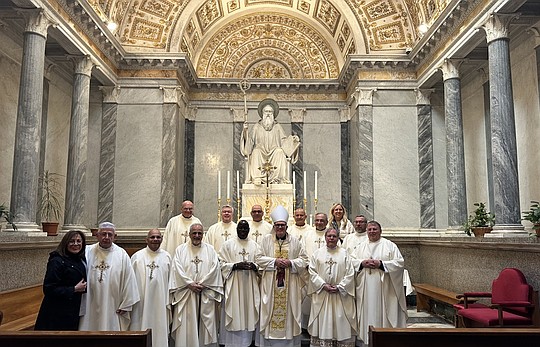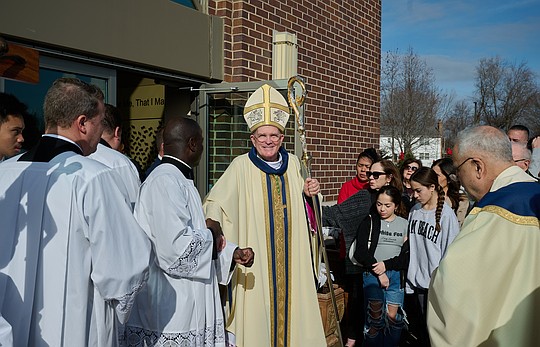Notre Dame High School begins Lent with talk on women Doctors of the Church
February 27, 2023 at 9:14 p.m.

The Catholic Church recognizes thousands of officially canonized saints. Among them, there are only 37 who hold the title Doctor of the Church. Four of them are women.
Father Jason Parzynski, chaplain, Notre Dame High School, Lawrenceville, and diocesan vocation director, explained that because these were “incredible women who really had a tremendous impact on the Church,” he and members of the ND Advancement Committee, decided that offering a talk on the lives of these particular saints would be an important and compelling topic for a Lenten talk.
Held Feb. 24 in Notre Dame High School, the talk was originally planned for Notre Dame alumni as part of the school’s efforts towards enhancing Catholic identity and mission, both of which “are at the forefront of everything we do,” said Maggie Kelly, ND vice president and director of Institutional Advancement.
But when word got out that Father Parzynski was offering a talk on the four women Doctors of the Church – St. Hildegard of Bingen, St. Catherine of Siena, St. Teresa of Avila, and St. Thérèse of Lisieux – interest from those outside the ND community warranted expanding the invitation beyond the original audience.
In traditional Lenten fashion, the evening began with a soup and bread dinner and time for fellowship. The light supper was followed by a welcome from ND President Ken Jennings, who shared the importance that the school, its faculty and staff place on growing Catholic identity and education in the faith, leading into Father Jason’s talk as an example of these collective efforts.
At the outset of his talk, Father Parzynski explained that a Doctor of the Church is a person who is not only a canonized saint who lived a life of great holiness, but one whose teaching on matters of the faith is sound and of great benefit to the faithful.
He then offered an overview of a brief history of how one is designated a Doctor of the Church and delved into fascinating portraits of each of the saints. While these women lived in different times and places, Father Parzynski highlighted those qualities they had in common, such as their courage in speaking the truth even in difficult and intimidating circumstances, and the personal struggles which they were each able to surmount humbly and faithfully as they sought to glorify God with their lives.
The talk was greeted with appreciation and enthusiasm by attendees, and by the following Monday, Kelly noted that she was “still fielding calls and emails asking when we are going to do it again, and what the subject might be.”
While the rich lives of these saints were marked with many inspiring details, perhaps their ability to face suffering with the help of their great personal faith was most relevant to our current journey through Lent, suggested Father Parzynski, who also observed that while in our society, we tend to “lose sight of the value of suffering,” these saints give us the gift of teaching us a different perspective.
“These four women,” he noted, “show us that by having faith and trust in Christ, not only can we endure any type of suffering, but that our suffering can become transformative both in our own lives and in those around us.”
Related Stories
Friday, January 02, 2026
E-Editions
Events
The Catholic Church recognizes thousands of officially canonized saints. Among them, there are only 37 who hold the title Doctor of the Church. Four of them are women.
Father Jason Parzynski, chaplain, Notre Dame High School, Lawrenceville, and diocesan vocation director, explained that because these were “incredible women who really had a tremendous impact on the Church,” he and members of the ND Advancement Committee, decided that offering a talk on the lives of these particular saints would be an important and compelling topic for a Lenten talk.
Held Feb. 24 in Notre Dame High School, the talk was originally planned for Notre Dame alumni as part of the school’s efforts towards enhancing Catholic identity and mission, both of which “are at the forefront of everything we do,” said Maggie Kelly, ND vice president and director of Institutional Advancement.
But when word got out that Father Parzynski was offering a talk on the four women Doctors of the Church – St. Hildegard of Bingen, St. Catherine of Siena, St. Teresa of Avila, and St. Thérèse of Lisieux – interest from those outside the ND community warranted expanding the invitation beyond the original audience.
In traditional Lenten fashion, the evening began with a soup and bread dinner and time for fellowship. The light supper was followed by a welcome from ND President Ken Jennings, who shared the importance that the school, its faculty and staff place on growing Catholic identity and education in the faith, leading into Father Jason’s talk as an example of these collective efforts.
At the outset of his talk, Father Parzynski explained that a Doctor of the Church is a person who is not only a canonized saint who lived a life of great holiness, but one whose teaching on matters of the faith is sound and of great benefit to the faithful.
He then offered an overview of a brief history of how one is designated a Doctor of the Church and delved into fascinating portraits of each of the saints. While these women lived in different times and places, Father Parzynski highlighted those qualities they had in common, such as their courage in speaking the truth even in difficult and intimidating circumstances, and the personal struggles which they were each able to surmount humbly and faithfully as they sought to glorify God with their lives.
The talk was greeted with appreciation and enthusiasm by attendees, and by the following Monday, Kelly noted that she was “still fielding calls and emails asking when we are going to do it again, and what the subject might be.”
While the rich lives of these saints were marked with many inspiring details, perhaps their ability to face suffering with the help of their great personal faith was most relevant to our current journey through Lent, suggested Father Parzynski, who also observed that while in our society, we tend to “lose sight of the value of suffering,” these saints give us the gift of teaching us a different perspective.
“These four women,” he noted, “show us that by having faith and trust in Christ, not only can we endure any type of suffering, but that our suffering can become transformative both in our own lives and in those around us.”










